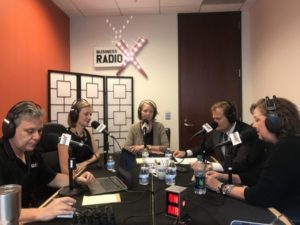
HOW MANY GENERATIONS ARE AROUND YOUR WATER COOLER?
In the most recent years, marketers and employers have been attempting a multitude of strategies to figure out who Millennials really are and what their expectations about life, job and product are. For those who are still struggling to understand Millennials, and the most effective means to connect with them, Generation Z has reached the workforce.
While some marketers can at least claim a little success in cracking the millennial code, others have just given up and returned to re-focus on what worked to attract consumers in the past. Employers who have tried everything from ping pong tables, paid-time off for advocating for social justice issues and work from home models in order to attract, inspire and retain effective millennial employees are still evaluating the totality of their experiences. Are we now supposed to scrap everything and retool corporate strategies for the new generation?
Generation Z consists of those born in 1996 or later. They make up 25.9% of the United States population and are expected to contribute $44 billion to the American economy. By 2020, they will account for one-third of the U.S. population. The most tech savvy and information consuming generation in history, Generation “Z’ers” tend to be less focused on a single thought but are demonstrating an amazing ability to multitask and a lack of patience with a single subject; bad news for War and Peace sized novel writers and good news for publishers of an abbreviated Readers Digest.
This generation has grown up accustomed to the fast paced development of technology. They are perpetual in their use of smart, digital devices and spend less time watching TV than their forbearers. “We are the first true digital natives,” said Hannah Payne, an 18-year-old U.C.L.A. student and lifestyle blogger. “I can almost simultaneously create a document, edit it, post a photo on Instagram and talk on the phone, all from the user-friendly interface of my iPhone. Generation Z takes in information instantaneously, and loses interest just as fast.” As result, marketers are experiencing a massive shift in advertising methods and content messaging in order to successfully connect with generation Z’s shifting values. “When it doesn’t get there that fast they think something’s wrong,” said Marcie Merriman, executive director of growth strategy at Ernst & Young. “They expect businesses, brands and retailers to be loyal to them. If they don’t feel appreciated, they’re going to move on. It’s not about them being loyal to the business.”
Gen Z-ers have digitally honed social insights but are more socially diverse and conscious. They are more likely to appreciate the face to face relationships than their predecessors. Wanting to do great work for an employer, they are predicted to be willing to invest years in a job that propels them forward to achieving their personal self-development. Many are shunning traditional routes to higher education opting instead for online education while they practice making a living. According to Gen Z marketing strategist Deep Patel, “the newly developing high tech and highly networked world has resulted in an entire generation thinking and acting more entrepreneurially.” Generation Z desires more independent work environments with nearly 75% of Gen Z teens espousing an ultimate goal to start their own business. “Kids are witnessing start-up companies make it big instantly via social media,” said Andrew Schoonover, a 15-year-old in Olathe, Kan. “We do not want to work at a local fast-food joint for a summer job. We want to make our own business because we see the lucky few who make it big.”
But with all the hype and predictions of generational differences is the next mega market group really all that different from their parents and grandparents?
When developing a strategy to segment any market we must realize that no one generation does a market segment make. Each generation, while differing in the methods of making connections, will invent many new insights and social behaviors but also retain important aspects of connectivity from their predecessors. Generation X, Millennials, Z’ers and Baby Boomers are all occupying the same marketplace and sharing the same water cooler conversations at work. It will require marketers and employers to maintain due vigilance as each generation continues to morph into the multitude of individuals they want to become.
How are you adapting your organization to accommodate 4 generations?



